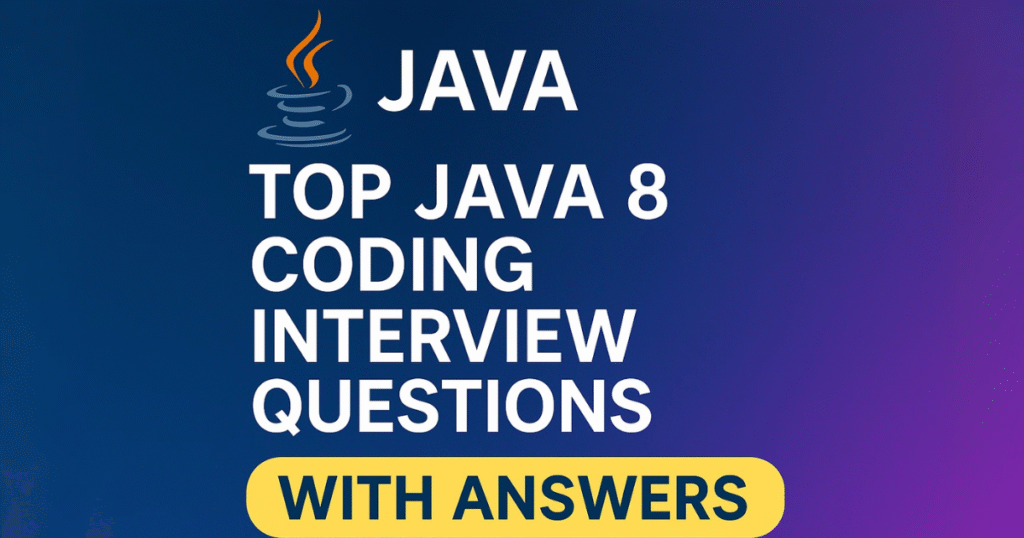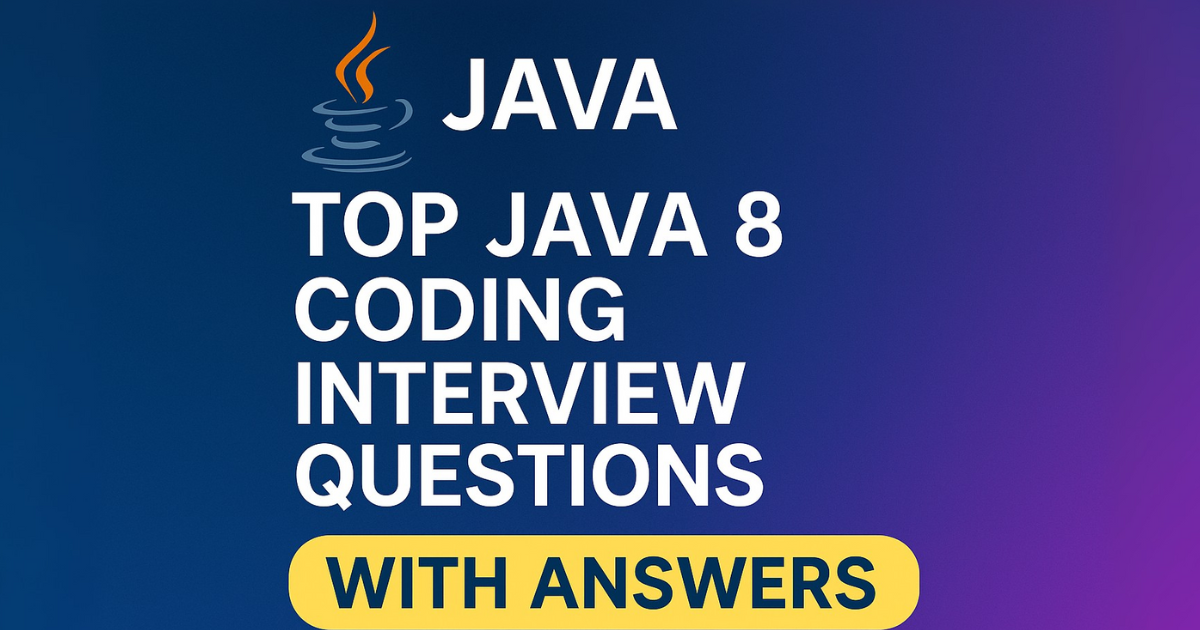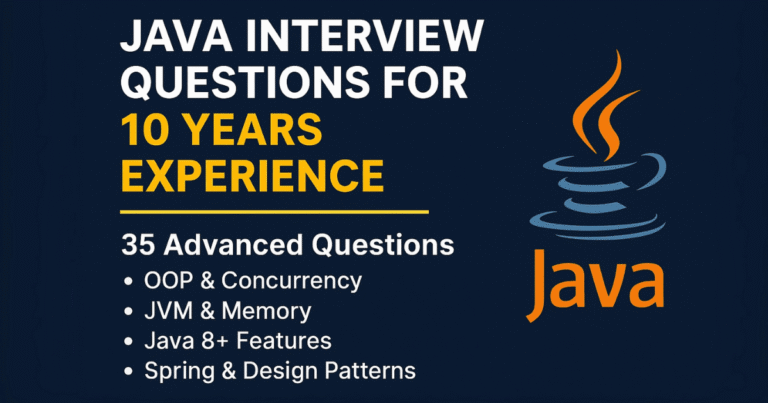Top Java 8 Coding Interview Questions and Answers (With Code) – 2025

Are you preparing for a Java interview focused on Java 8 features? This blog will help you master the most frequently asked Java 8 coding questions, especially around Streams, Collectors, and functional-style programming. From beginner-level problems to advanced real-world challenges, we’ve covered them all with concise explanations and working examples.
🧠 Why Java 8 Coding Interview Questions Matter in Interviews
Java 8 introduced powerful functional programming capabilities with Streams, Lambda expressions, and Collectors. These concepts have become essential in real-world Java development and are now a core part of interviews.
✅ Beginner to Intermediate Java 8 Coding Questions
1. Find even numbers from a list using streams
list.stream()
.filter(n -> n % 2 == 0)
.collect(Collectors.toList());
2. Convert a list of strings to uppercase using streams
list.stream()
.map(String::toUpperCase)
.collect(Collectors.toList());
3. Filter names starting with ‘S’ from a list
list.stream()
.filter(name -> name.startsWith("S"))
.collect(Collectors.toList());
4. Count the number of elements in a list using streams
long count = list.stream().count();
5. Sort a list of integers in descending order using streams
list.stream()
.sorted(Comparator.reverseOrder())
.collect(Collectors.toList());
6. Remove duplicate elements from a list using streams
list.stream()
.distinct()
.collect(Collectors.toList());
7. Find the first non-repeated character in a string using streams
Character result = str.chars()
.mapToObj(c -> (char) c)
.collect(Collectors.groupingBy(c -> c, LinkedHashMap::new, Collectors.counting()))
.entrySet().stream()
.filter(e -> e.getValue() == 1)
.map(Map.Entry::getKey)
.findFirst().orElse(null);
8. Find the maximum and minimum element in a list using streams
int max = list.stream().max(Integer::compareTo).get();
int min = list.stream().min(Integer::compareTo).get();
9. Find the sum and average of a list of integers
int sum = list.stream().mapToInt(Integer::intValue).sum();
double avg = list.stream().mapToInt(Integer::intValue).average().orElse(0.0);
10. Check if all elements are even using allMatch()
boolean allEven = list.stream().allMatch(n -> n % 2 == 0);
🔥 Advanced Java 8 Stream Interview Questions
11. Group a list of employees by department
Map<String, List<Employee>> deptMap =
employees.stream().collect(Collectors.groupingBy(Employee::getDepartment));
12. Count the number of employees in each department
Map<String, Long> countMap =
employees.stream().collect(Collectors.groupingBy(Employee::getDepartment, Collectors.counting()));
13. Find the second highest salary
Optional<Integer> secondHighest = salaries.stream()
.sorted(Comparator.reverseOrder())
.distinct()
.skip(1)
.findFirst();
14. Partition a list into even and odd using partitioningBy
Map<Boolean, List<Integer>> partitioned =
list.stream().collect(Collectors.partitioningBy(n -> n % 2 == 0));
15. Flatten a list of lists using flatMap
List<Integer> flatList =
listOfLists.stream().flatMap(List::stream).collect(Collectors.toList());
16. Find duplicate elements in a list using streams
Set<Integer> seen = new HashSet<>();
Set<Integer> duplicates =
list.stream().filter(n -> !seen.add(n)).collect(Collectors.toSet());
17. Find the most frequent element in a list
Integer mostFrequent = list.stream()
.collect(Collectors.groupingBy(Function.identity(), Collectors.counting()))
.entrySet().stream()
.max(Map.Entry.comparingByValue())
.map(Map.Entry::getKey).orElse(null);
18. Sort a map by its values using streams
map.entrySet().stream()
.sorted(Map.Entry.comparingByValue())
.collect(Collectors.toMap(
Map.Entry::getKey, Map.Entry::getValue,
(e1, e2) -> e1, LinkedHashMap::new));
19. Convert a list to a map using Collectors.toMap
Map<Integer, String> map =
list.stream().collect(Collectors.toMap(Employee::getId, Employee::getName));
20. Create a comma-separated string from a list
String result = list.stream()
.map(String::valueOf)
.collect(Collectors.joining(", "));
📌 Final Tips for Java 8 Interviews
- Use
Streamswhen dealing with collections. - Always prefer
Collectors.groupingBy,map,filter, andflatMapin chained operations. - Master
Optional,Predicate,Function, andConsumerinterfaces.
🧾 Helpful Resources
What are Java 8 Streams and why are they important in interviews?
Java 8 Streams are used to process collections of data in a functional style. They’re popular in interviews because they help write cleaner, more readable, and more efficient code — especially for filtering, mapping, and aggregating data.
How can I get better at solving Java 8 coding interview questions?
Start by solving common tasks like filtering, grouping, sorting, and mapping collections. Practice on real-world datasets, and explore interview-style questions like “second highest salary” or “grouping by department.” Focus on writing code using map, filter, collect, flatMap, and groupingBy.
Are Java 8 Streams faster than traditional loops?
Not always. Streams are more readable and declarative, but they’re not always faster than traditional for-loops. For large datasets or performance-critical operations, use them carefully and benchmark if needed. However, their clarity and expressiveness make them a strong choice in interviews.
What’s the difference between map() and flatMap() in streams?
map() is used to transform each element.flatMap() is used when you have a stream of collections (e.g., List<List<Integer>>) and you want to flatten it into a single stream.
Think of map() as one-to-one and flatMap() as one-to-many.
How do I find duplicates in a list using Java 8 Streams?
You can track duplicates using a Set. As you stream through the list, use filter() to check if the element is already seen. If it is, it’s a duplicate. This is a common interview favorite.
Can I use Java Streams to modify the original list?
No, streams are designed to be non-mutating. They don’t change the original collection. Instead, they return a new stream or result. If you need to modify the original list, use traditional loops or the List.replaceAll() method.
How do I answer Java 8 stream questions in interviews under pressure?
Stay calm. Break the problem into smaller parts. Think about whether you need to filter, transform, group, or aggregate. Start with a simple stream, and build the logic step-by-step. Communicate your thought process clearly — that matters as much as the final code.
🙋 Got a Question?
Drop your queries in the comments or contact us here. We’re here to help you ace your Java interview! 🚀




6 Comments